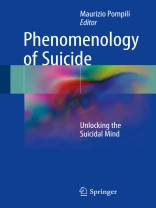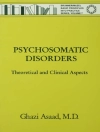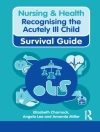This book will help the reader to understand the suicidal mind from a phenomenological point of view, shedding light on the feelings of suicidal individuals and also those of clinicians. In accordance with the importance that the phenomenological approach attaches to subjectivity and sense of self as the starting points for knowledge, emphasis is placed on the need for the clinician to focus on the subjective experiences of the at-risk individual, to set aside prior assumptions, judgments, or interpretations, and to identify ways of bridging gaps in communication associated with negative emotions. The vital importance of empathy is stressed, drawing attention to the insights offered by neuroimaging studies and the role of mirror neurons in social cognition.
It is widely acknowledged that when a clinician meets a person who wants to die by suicide, the clinician does not fully understand what is going on inside the mind of that individual. This book recognizes that any approach to suicide prevention must promote understanding of suicidal thoughts and feelings. The awareness that it fosters and the innovative perspectives that it presents will appeal to a wide readership.
Tabla de materias
Secularization of suicide.- Phenomenology of suicide.- A phenomenological approach to suicidal mental life.- Neurodevelopmental perspectives in suicide risk.- Feelings and Intersubjectivity in suicide.- Empathy and emotional disconnection in difficult and uneasy situations: facing the suicidal individual.- Attachment theory and suicide risk.- Emotional dysregulation and suicide risk.- Countertransference with suicidal individuals.- Dissociation and therapeutic alliance.- Collaborative approach with suicidal wishes.- Getting to know survivors of suicide.- Experience of a serious suicide attempt.- Psychotherapy with suicidal patients – Edwin Shneidman.
Sobre el autor
Maurizio Pompili, MD, Ph D, is Associate Professor of Psychiatry and Professor of Suicidology in the Faculty of Medicine and Psychology, Sapienza University of Rome, Italy and also coordinator of the Suicide Prevention Center at Sant’Andrea Hospital in Rome. Dr. Pompili received his MD and completed his specialization in Psychiatry (both summa cum laude) from the Sapienza University of Rome and obtained his doctoral degree in Experimental and Clinical Neurosciences from the same university. He has been a visiting scientist at Mc Lean Hospital, Harvard Medical School, USA, where he received a fellowship in psychiatry. In 2008 Dr. Pompili received the American Association of Suicidology’s Shneidman Award for “Outstanding contributions in research in suicidology”. He was the Italian representative of the International Association for Suicide Prevention (IASP) for 8 years and served as co-chair of the IASP Council of National Representatives. He is also a member of the International Academy for Suicide Research and the American Association of Suicidology. Dr. Pompili has published more than 300 papers on suicide, including original research articles, book chapters, and editorials. He has co-edited ten international books on suicide, including Evidence-Based Practice in Suicidology (Hogrefe & Huberr) and Suicide in the Words of Suicidologists (Nova). Maurizio Pompili is particularly active in collaborations with the Italian Ministry of Health and Italian Health Institute. His H-index is 32 (Scopus, September 2015).












